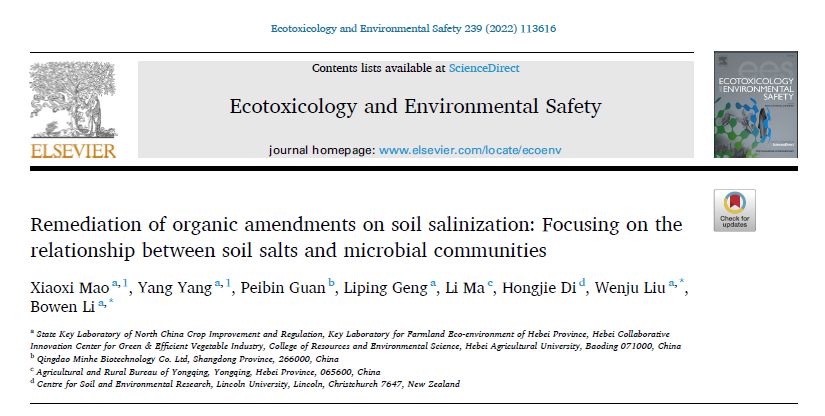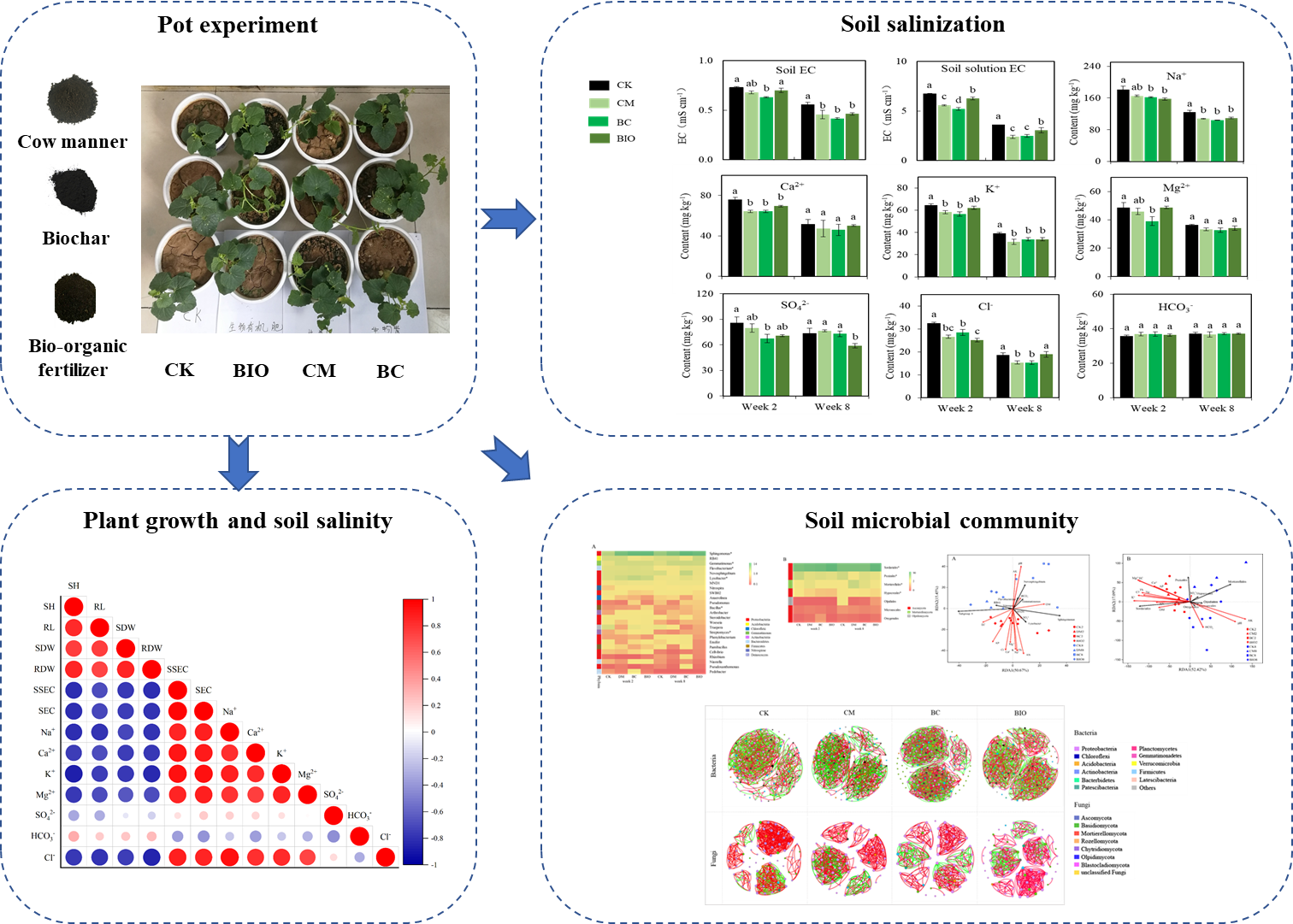近日,我室耐盐碱研究及应用创新团队揭示了土壤微生物在有机物料修复土壤盐渍化过程中的重要作用,相关成果发表于Ecotoxicology and Environmental Safety(IF=6.291)。

Highlights
Cow manure, biochar, and bio-organic fertilizer alleviated soil salinization.
Soil microbiome significantly responded to soil salt indicators via organic amendments.
Organic amendments increased the complexity of microbial networks in saline soil.
Soil microbiome plays a key role in remediating saline soil by applying organic amendments.
Abstract
Soil salinization has emerged as a major factor with an adverse influence on agricultural green development worldwide. It is necessary to develop high-efficiency and ecologically beneficial management measures for alleviating soil salinization. The experiment of application for cow manure (CM), biochar (BC), and bio-organic fertilizer (BIO) in soil with light salinity was conducted to investigate the remediation of organic materials on soil salinization with melon (Cucumis melo L.) by reducing the availability of saline ions and shifting the soil microbial community. Results showed that BC treatment significantly decreased the EC values of the soil and soil solution by 19.23% and 27.02% and the concentrations of Na+, K+, and Cl- by 13.28%, 13.08%, and 15.21%, respectively, followed by CM and BIO treatments. High-throughput sequencing identified that organic amendments significantly improved the richness of the soil bacterial community and increased the relative abundances of Acidobacteria and Firmicutes by 33.11% and 111.2%, respectively, and the beneficial salt-tolerant bacterial genera Flavobacterium, Bacillus and Arthrobacter by 32.04%, 38.92% and 35.67%, respectively. Additionally, soil Na+, Ca2+, K+ and Cl- were significantly negatively correlated with Acidobacteria and Flavobacterium and were also the most important factors driving the changes in the structure of the soil bacterial communities. The bacterial networks were more complex in the organic amendments treatments than in CK, reflecting through more nodes and links and a higher average clustering coefficient, density and modularity. This study provided a comprehensive understanding of the application of organic amendments in alleviating soil salinization and improving soil bacterial and fungal communities and provides scientific support for agriculture green development.

土壤盐渍化是制约农业绿色发展的重要因素,尤其是在滨海地区,地下水不合理开采和海水入侵导致土壤盐渍化问题日益严重。近年来,随着工农业的发展,世界上每天会产生大量的有机废弃物,已有研究表明,将这些有机物料施入土壤中不仅可以有效地缓解土壤盐渍化,还可通过改善土壤微生物群落进而培育健康土壤。那么,有机物料在修复土壤盐渍化过程中,土壤微生物与土壤盐分离子之间的关系如何目前尚不清楚。
基于此,该研究以滨海地区轻度盐渍化设施甜瓜土壤为研究对象,研究了施用有机物料:牛粪、生物炭、生物有机肥对盐渍化土壤中盐分离子和土壤微生物群落的影响。结果表明,首先施用3种有机物料均可缓解土壤盐渍化并促进甜瓜植株生长,其中生物炭处理效果最佳,显著降低了土壤EC值及盐分离子Na+, K+, Cl-的浓度分别达19.23%和13.28%,13.08%, 15.21%。其次,施用有机物料可以提高土壤细菌群落多样性指数,显著增加有益耐盐黄杆菌属、芽孢杆菌属和节细菌属的相对丰度,并增强了土壤微生物网络结构的复杂性,进而改善了土壤微生物群落的组成与结构。进一步相关性分析发现,土壤盐分离子Na+, Ca2+, K+, Cl-浓度与土壤酸杆菌门和黄杆菌属的相对丰度呈显著负相关关系,其同时也是土壤微生物群落结构变化的主要驱动因子,说明施用有机物料后,土壤微生物群落组成及结构与土壤盐分离子有效性存在密切关系。该项成果揭示了土壤微生物在有机物料修复土壤盐渍化过程中的重要作用。
博士生毛晓曦和杨扬为该论文的共同第一作者,作物耐盐碱研究及应用创新团队刘文菊教授和李博文教授为通讯作者,该研究得到了河北省农业产业体系和华北作物改良与调控国家重点实验室的资助。